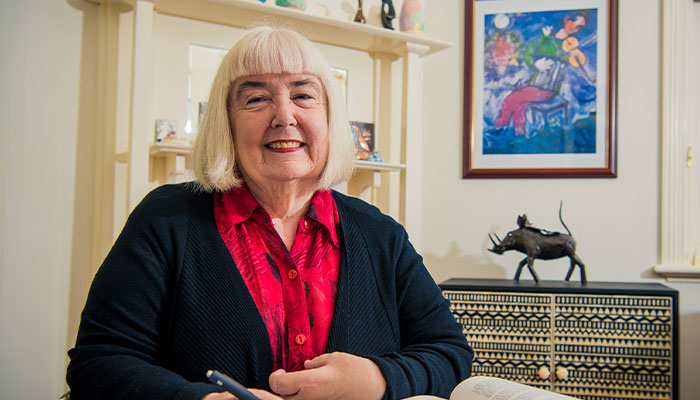"Happy families are all alike; every unhappy family is unhappy in its own way". This opening sentence of Tolstoy's Anna Karenina, is one of the most famous lines in literature. But in what ways are happy families alike?

Role models: The family from the hit Australian movie The Castle provides many good examples of family members having positive expectations of each other, says Dr Fitness.
A happy, well-functioning family has many common features, but a lack of conflict isn't one of them. All family members will sometimes rub each other the wrong way, argue with one another and hurt each other's feelings, sometimes seriously. But the features common to happy families are security, trust, and tolerance; gratitude and pride in one another; and the enjoyment that comes from being playful with one another.
There has been a lot of longitudinal research demonstrating that the strength of the bonds within the marital relationship and between parents and children is what affords people resilience when times are tough. Whether that's lockdown right now, or fire, floods, unemployment, crime, mental illness; we are all going to have to deal with challenges and heartaches as we go through our lives.
However, children who have been brought up in secure, warm, emotionally responsive environments build a capacity to trust others, and to be comfortable both with providing and accepting support in their adult lives. This helps them to cope with life's challenges, and to help others cope with them too.
The role of emotional intelligence
I have argued that over time, successful marriages acquire a character of their own that may be described as "emotionally intelligent".

Share the love: A married couple who achieves happiness needs to open up that emotional world to their children as well.
The emotional intelligence literature suggests that individuals may be more or less "intelligent" with respect to four, interrelated abilities: the ability to accurately perceive and express emotions; the ability to draw upon one's own emotions to imagine how others are feeling and to empathise with them; the ability to understand what causes different emotions and what their outcomes might be like; and the ability to effectively manage one's own and others' emotions. A growing body of research attests to the crucial role played by each of these abilities in promoting marital stability and happiness.
A married couple who achieves this happiness needs to open up that emotional world – extend that bubble of joy and affection and empathy – to their children as well. Emotions are the key to understanding other people's needs, whether it's a baby crying in hunger, a toddler screaming in frustration, or a partner hurt by a brutal criticism.
In families where emotions are shut down, misunderstood, dismissed or punished, needs are likely not being understood or met. It is our openness to respond to each other's emotions, without being overwhelmed but with genuine empathy, that builds trusting relationships where people can be vulnerable to each other without fear of rejection.
The important thing for family harmony is not the emotion, it's how you deal with it. This means not punishing your partner or your child for having an emotion.
This may mean taking a step back, rather than lashing out, when a family member's anger is being directed at you. The impulse to be defensive when someone, especially a teenager, is hurling abuse for something you have done or neglected to do, is pretty natural. Anger is an important emotional response that is telling us hey, that's not fair, that's not right, you shouldn't treat me this way.
The important thing for family harmony is not the emotion, it's how you deal with it. This means not punishing your partner or your child for having an emotion – although you might want to encourage them to express it in a less hostile way – but rather, it's about seeing it as an opportunity to get at what is going on for this person: what are they needing, what is happening for them? And in doing that you are expressing empathy and caring, a much more constructive response than angry reciprocation.
Being emotionally intelligent also means looking beyond a family member's rage and hostility and responding to the more vulnerable emotions that may lie underneath, such as fear, hurt, and sadness.
Research also shows the importance of frequently expressing positive emotions like love, admiration, and gratitude in family relationships. Typically, happy families create what has been called a culture of appreciation, where family members have positive expectations of each other and are ready to give one another the benefit of the doubt when things go wrong (the Australian movie The Castle provides many good examples of this).
The virtue of positive expectations is that expecting the good, and being ready to perceive the good and reward it whenever you see it, encourages people to behave better. But, your expectations shouldn't be so unrealistic that nobody can live up to them either!
One is not enough
Do both partners in a marriage need to be emotionally intelligent to create a happy partnership? Interesting research published in 2005 found that relationships can thrive with just one partner being highly emotionally aware and empathic, though it may involve a lot of work for that partner.
Traditionally, the stereotype has been that wives and mothers have done the bulk of "emotion work" in families – mediating between children and fathers, organising everyone's social lives, being empathic and soothing, and generally taking care of family members' emotional needs. Research has shown that women have typically taken on this emotional role in families throughout history and across many cultures.
Research also shows the importance of frequently expressing positive emotions like love, admiration, and gratitude in family relationships.
However, while that may have worked in the past to facilitate the happiness of other family members, the costs for women of undertaking so much emotion labour have often been high. Today, we're seeing much more encouragement for men to pick up their share of that emotion work, and to develop their own empathy and emotional responsiveness within the family.
This sharing of the emotion work also provides a healthy model for children, who grow up as emotionally intelligent adults with the capacity to create their own happy families.
The damage done
It is difficult to develop emotional competence as an adult if you have grown up in a household where there is a lot of hostility, anger, shaming, and contempt; or just as importantly, where there has been a lack of positivity in an indifferent environment where not much emotion, or love, is expressed at all.

In it together: Julie Fitness (pictured) says the sharing of emotion work between partners provides a healthy model for children.
Children growing up in these environments form dysfunctional beliefs about themselves, their feelings, and relationships with others. Then in adulthood, they may look for partners who reinforce the messages that are so strongly embedded inside their heads; that people can't be trusted, that I'm a bad person, that I deserve bad treatment, that I need to hide my feelings, and that the world is a frightening place where no one really loves me. If that is our internal script, we tend to look for partners who confirm our worst fears about one another, and about ourselves.
But people can change their scripts if they are willing to reflect upon, challenge and change these beliefs. In fact, it is quite possible for two people with very painful backgrounds to come together and to have enough motivation, insight, and support, to consciously create a different kind of family for themselves.
It's important to remember that happy families are not just 'made that way'; they are created through the ongoing love, commitment, and goodwill of family members.
Julie Fitness is Emeritus Professor in the Department of Psychology at Macquarie University.






